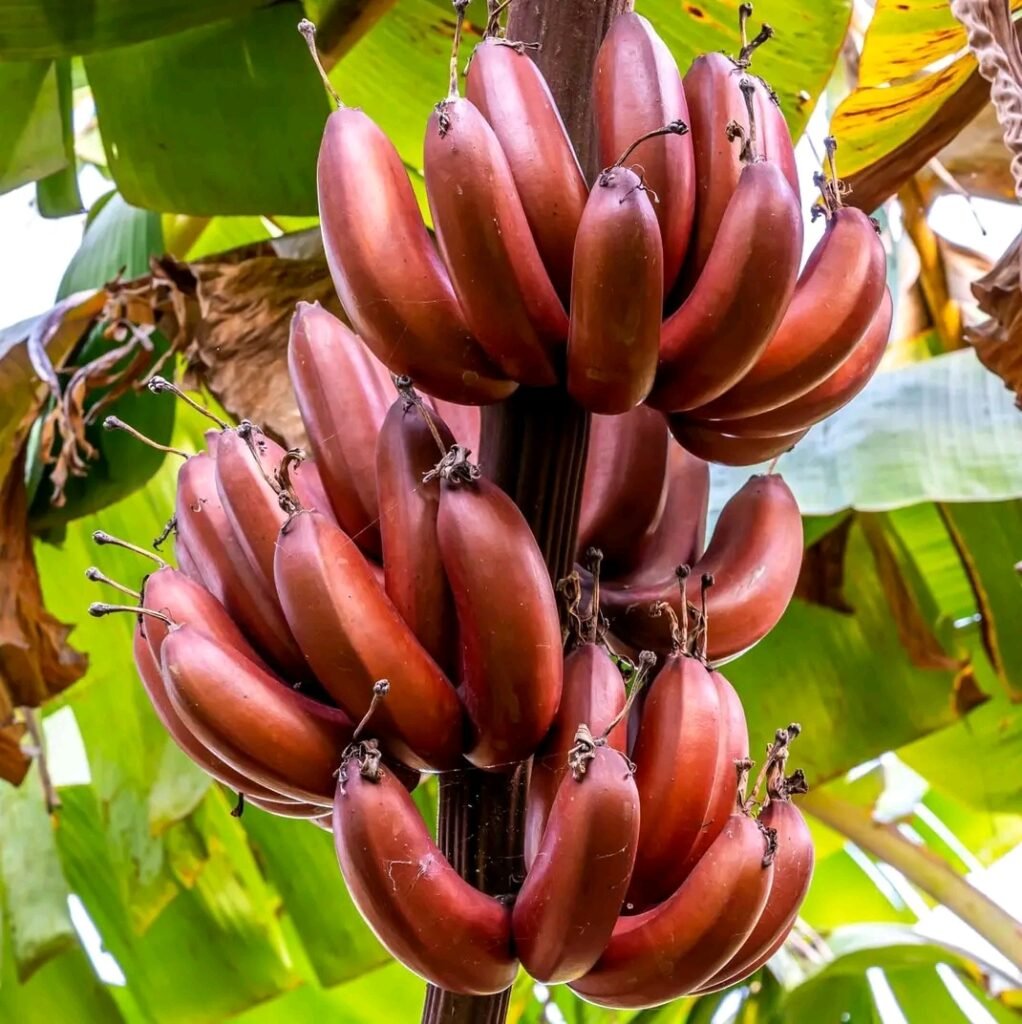
In this article
overview
When you think of bananas, the yellow variety likely comes to mind. However, red bananas, with their vibrant reddish-purple skin and unique flavor, offer a delightful twist. Native to tropical regions like Southeast Asia and Australia, red bananas not only captivate with their color but also pack a punch with their nutritional benefits. Let’s dive into why these lesser-known fruits deserve a spot in your diet.
Rich Nutrient Profile: Why Red Bananas Stand Out
Heart Health Boosters
Your heart requires a consistent intake of essential nutrients to remain healthy. Red bananas are abundant in potassium and magnesium, two vital minerals for cardiovascular well-being. These nutrients assist in regulating blood pressure by relaxing blood vessels and aiding in the elimination of excess sodium through urine. Studies show that boosting your potassium and magnesium intake can markedly lower the risk of high blood pressure, a significant factor in heart disease. For example, consuming an additional 100 milligrams of magnesium daily can reduce the risk of hypertension by 5%, while a daily increase of 0.6 grams of potassium can decrease systolic and diastolic blood pressure by 1.0 mmHg and 0.52 mmHg, respectively.
Eating two medium-sized red bananas daily provides about 14% and 18% of your daily magnesium and potassium needs, making them a delicious and effective way to support heart health.
Antioxidant Powerhouse
Red bananas are not just rich in vitamins like C and B6; they are also loaded with antioxidants, particularly carotenoids. These plant pigments, which give red bananas their color, have powerful antioxidant properties that help neutralize free radicals, thus protecting your cells from damage. Beta-carotene and lutein, prominent carotenoids in red bananas, have been shown to reduce the risk of chronic diseases, including certain cancers and heart disease. Studies suggest that higher blood levels of carotenoids can lower the risk of breast cancer and improve overall cardiovascular health.
Supporting Eye Health
Carotenoids like beta-carotene and lutein found in red bananas are not only good for your overall health but also play a vital role in maintaining eye health. These compounds help protect your eyes from oxidative stress and inflammation, reducing the risk of conditions such as age-related macular degeneration (ARMD), the leading cause of irreversible blindness in older adults. Diets high in carotenoid-rich foods have also been linked to a lower risk of glaucoma, a condition characterized by increased eye pressure and potential vision loss.
Digestive Health: Fiber and Beyond
Red bananas, like their yellow counterparts, are notable for their fiber content. Many people do not meet the daily recommended fiber intake of 28 grams, but adding red bananas to your diet can help address this deficiency. Fiber aids in maintaining regular bowel movements and alleviating constipation by softening stool and facilitating its passage. Additionally, unripe bananas are rich in resistant starch, a type of fiber that nourishes beneficial gut bacteria and leads to the production of short-chain fatty acids (SCFAs) such as butyrate. These SCFAs enhance digestive health by fortifying the gut lining and managing inflammation.
However, as bananas ripen, their resistant starch content decreases. Therefore, if you want to maximize the benefits of resistant starch, opt for underripe red bananas, which are starchier and less sweet than their ripe counterparts.
Nutritional Red Bananas
Red bananas share a similar nutritional profile with yellow bananas but are particularly rich in certain nutrients. A medium-sized red banana (118 grams) contains approximately:
- Calories: 105
- Carbohydrates: 26.9 grams
- Protein: 1.29 grams
- Fat: <1 gram
- Fiber: 3.07 grams
- Vitamin B6: 0.433 milligrams (25% DV)
- Manganese: 0.319 milligrams (14% DV)
- Vitamin C: 10.3 milligrams (11% DV)
- Copper: 0.092 milligrams (10% DV)
- Potassium: 422 milligrams (9% DV)
Vitamin B6 is essential for immune function and hemoglobin production, while vitamin C is a potent antioxidant that supports immune health and collagen production. Manganese plays a role in energy metabolism and nervous system function, further highlighting the comprehensive nutritional benefits of red bananas.
Potential Risks and Precautions
While red bananas are generally safe for most people, they can cause digestive discomfort in some individuals due to their high oligo-fructan content. These carbohydrates belong to a group known as FODMAPs, which can trigger symptoms like gas, bloating, and diarrhea, especially in people with irritable bowel syndrome (IBS). Additionally, the high carbohydrate content in bananas means they should be consumed in moderation by individuals with diabetes or those managing blood sugar levels. Lastly, some people may be allergic to bananas and should avoid them altogether.
How to Enjoy Red Bananas
Red bananas can be enjoyed in various ways, making them a versatile addition to your diet. Here are some ideas:
- Eat them as a snack.
- Add them to smoothies or yogurt bowls.
- Use them in baked goods like muffins and bread.
- Include them in pancakes, milkshakes, or puddings.
Embracing the Benefits of Red Bananas
Red bananas are a nutritious and delicious alternative to more common banana varieties, offering unique health benefits due to their rich nutrient and antioxidant content. From supporting heart and eye health to promoting digestive well-being, these vibrant fruits are a worthy addition to any diet. So, next time you’re at the market, consider picking up a bunch of red bananas and enjoy their sweet, slightly raspberry-like flavor while reaping their numerous health benefits
A Quick Review
Red bananas, rich in fiber, potassium, and magnesium, support digestive and heart health. Their fiber content promotes regular bowel movements, while resistant starch in unripe bananas aids gut health. Additionally, these minerals help regulate blood pressure and reduce the risk of heart disease
FAQS
What are the health benefits of red bananas?
Red bananas are rich in fiber, potassium, and magnesium, which support digestive and heart health.
How do red bananas support digestive health?
The fiber in red bananas promotes regular bowel movements and prevents constipation. Unripe bananas contain resistant starch that feeds beneficial gut bacteria.
Can red bananas help with blood pressure?
Yes, the potassium and magnesium in red bananas help regulate blood pressure by relaxing blood vessels and promoting sodium excretion.
How much potassium and magnesium do red bananas provide?
While the exact amounts can vary, red bananas are generally high in these essential minerals, contributing significantly to daily nutritional needs.












